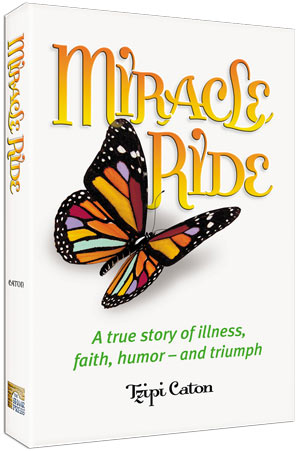
Reviewed by Ariella Marcus
Miracle Ride begins in 2003. Tzipi remembers, “The first thing that went through my mind was that I must’ve had a brick in my neck. It was Thursday, at the end of first period, and I was bending down to get my siddur, when suddenly it hurt to move my head. Instinctively, my hands went to my neck and I felt two big bumps I’d never felt before.”
Tzipi’s spirited attitude, which suffuses the book, emerges in the first chapter when she quips, “Eleventh grade was so not a picnic.” She describes her joy at being a Jewish girl – until she hit a hard wall of realization. “I was a JAP. I was the girl who loved everything about being a girl. The clothing, the shoes, the makeup, the shoes, the accessories, the shoes, the jewelry, the shoes, doing my long dark hair, the shoes, and did I mention the shoes? My days as a JAP seemed to be changing into my days as a JACP. A Jewish American Princess turning into a Jewish American Cancer Patient.”
The story races rollercoaster-like through the shock of diagnosis, the search for the best medical care, the awkward agonies of chemotherapy, the struggle for normalcy, the curious fraternity shared by fellow cancer patients, and a family and community that prays, cares, and wonders why. After many poignant twists and turns, the book hurtles toward an amazing-but-true story book ending which left this reviewer breathless with gratitude.
Miracle Ride is one of those once-in-a-decade books that pole-vaulted to the top of my recommended reading stack. Its particular Jewish cultural and religious setting is a stimulating backdrop for its universal themes of hope, courage, faith, and determination. I got very attached to the personalities showcased in Tzipi’s journal. They enlightened my mind and deeply touched my heart. More than an entertaining human drama, Miracle Ride solicits action. When I reluctantly finished it, I knew I had to carry its impact into my world to make something better, to brighten someone’s day, to improve myself as a caring person.
There’s a compassionate spin-off developing with the publication of Miracle Ride. Friends, family, friends of friends and even strangers are committing resources to make this book available as an encouragement to cancer patients across the country. There is also hope that the book will generate more interest and support for Dr. Michael Harris’ vital work at Tomorrow’s Children’s Institute.
It’s been five years since Tzipi Caton’s miracle ride began. Today at 21, she’s a remarkable soul with a unique gift to reframe personal hardships into a storyline that can literally shift a reader’s view of what’s really important in life. She’s anything but shy in sharing the lessons of her recovery from cancer. Therefore, I predict we’ll see more published musings from this talented young author.
Hear Tzipi Caton's radio interview. See the audio section in the left column of this page.
View Table of Contents and Sample Pages here.
Visit Tzipi Caton's blog here.
Reviewer: Ariella.Marcus@gmail.com


